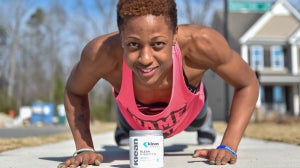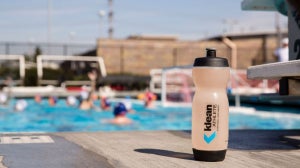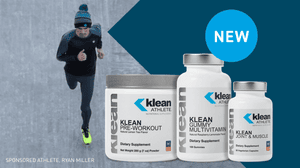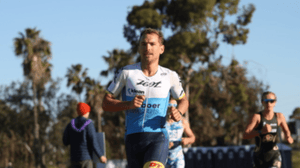
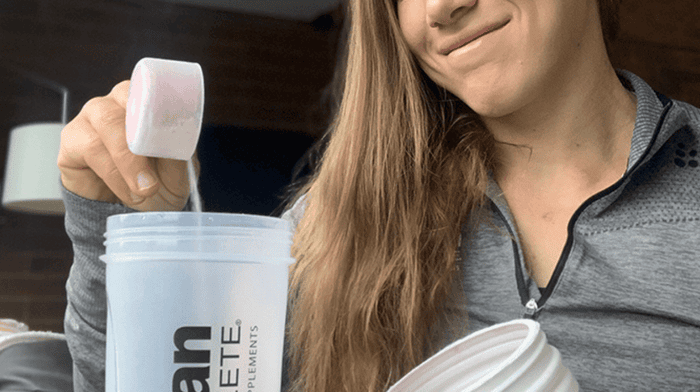
Created by Karlyn Grimes, MS, RD, LDN, CSSD+
Thus far, Klean’s Nutrient Timing series has focused on the peri-exercise time period, but this is only a small fraction of the day. To perform optimally, nutrient timing cannot be ignored during the remaining daily hours. Research has shown that small, frequent fueling and dietary supplement sessions throughout the day maximize subsequent exercise training and performance.1 In other words, nutritional support for sport has no end, and there never appears to be a disadvantage associated with fueling at any time surrounding an exercise bout. Let’s dig in to some vital daily fueling guidelines.‡

24/7 Maintenance Plan
Break the Fast
If early morning training is your jive, then pre-exercise fueling is key to a productive workout. Research studies have found that training in a fasted state results in performance decline, especially during prolonged exercise, compared to training in a fed state2. Performance fall-off is even noted in athletes that workout after lunch, but chose to skip breakfast. So now the obvious question to ask is: Got breakfast?
Carbohydrates
As we know, regardless of sport, carbs are an athlete’s best friend. Athletes should aim to hit the following daily carb guidelines specific to their sport to ensure adequately stocked glycogen stores and to prevent unnecessary immune suppression which can lead to frequent illness and negative performance consequences:6
Light to Moderate Intensity – Recreational Athletes (3-4 days/wk for <1 hr/d): 4-6 g/kg
Moderate Intensity – Competitive Athletes (5-6 days/wk; 1-2 hr/d): 6-8 g/kg
Moderate to High Intensity – Competitive Athletes (6-7 days/wk; 2-4 hr/d): 8-10 g/kg
Moderate to High Intensity – Ultra-Endurance Athletes (6-7 days/wk; >4 hr/d): 10-12 g/kg
Calculation Connection: 160 lb athlete 2 = 73 kg x 4-6 g/kg = 292 – 438 grams/day
The best carb choices throughout the day include 100% whole grains, starchy veggies, fruits and low-fat dairy which will also bolster fiber, protein, micronutrient and phytochemical intake.
Proteins
Studies have found that Protein Pacing, a strategy that incorporates small, frequent protein feedings (~20-30 grams per feeding) throughout the day, including prior to sleep7, is a great way to maximize muscle protein synthesis (MPS), recovery and overall performance while leading to increases in lean body mass and reduced body fat levels.1
Fruit smoothies, containing 1 scoop of Klean Isolate Protein Powder, are a great way to infuse the body with high quality whey protein throughout the day, including leucine. The addition of Greek yogurt, low fat milk or a non-dairy alternative, unsweetened frozen fruits, baby carrots, baby spinach or kale, mini peppers, flax and chia seeds, a tablespoon of nut butter and other favorites to your smoothie can provide the body antioxidants and phytochemicals.‡
Athletes may also benefit from going the extra mile by consuming branched chain amino acids (BCAA), namely leucine, valine and isoleucine, which have been linked to support muscle repair, immune function, and overall recovery. During exercise, ATP is released from human red blood cells when oxygen is low in a working muscle region. As a result, vasodilation occurs and increases blood flow to the muscle. Increased blood flow assists in the delivery of oxygen and nutrients to the cell and supports tissues in the body. Human and animal studies show ATP supplementation increases blood flow following exercise.
The Solution: Mix 1 scoop of Klean BCAA + Peak ATP with 8-10 oz. of water or other beverage, and blend well.‡
Fats
Although fat is not recommended before, during or after exercise, the perfect time for this nutrient is between sweat sessions. Premier fats include omega-3 polyunsaturated and monounsaturated fatty acids.
To augment omega-3 fatty acid intake, consume more cold water fish, such as herring, mackerel, salmon and tuna; flaxseeds and chia seeds; walnuts and almonds; and any other omega-3 fortified foods.
The International Olympic Committee (IOC) recommends 2,000 milligrams of omega-3 fatty acids daily which can be hard to meet via diet alone. To ensure adequate omega-3 intake, consume one Klean Omega softgel daily a total of of EPA and DHA, the essential omega 3’s.
Foods high in monounsaturated fats include avocados; canola, olive, peanut and sesame oils; olives; nuts such as cashews, peanuts and pistachios; and sesame seeds.
Fluids and Electrolytes
Staying adequately hydrated in the peri-exercise period and throughout the day can replenish electrolytes, retain hydration and help to achieve optimal performance.‡
On a daily basis, individuals exposed to normal environmental temperatures and performing light to moderate levels of activity require ~13 cups of water for men and ~9 cups for women. This is an absolute minimum for athletes participating in daily exercise sessions who must increase their fluid intake based on the frequency, intensity, duration and type of physical activity, environmental conditions and their body weight.
In general, if an athlete followed the peri-exercise guidelines for electrolytes, a well-balanced diet will help to further replenish their electrolyte levels, but if an athlete participates in long duration training sessions, especially in the heat, or multiple daily training sessions, supplemental electrolytes may be indicated. Conveniently, one to two Klean Electrolyte capsules can safely replenish electrolytes.‡
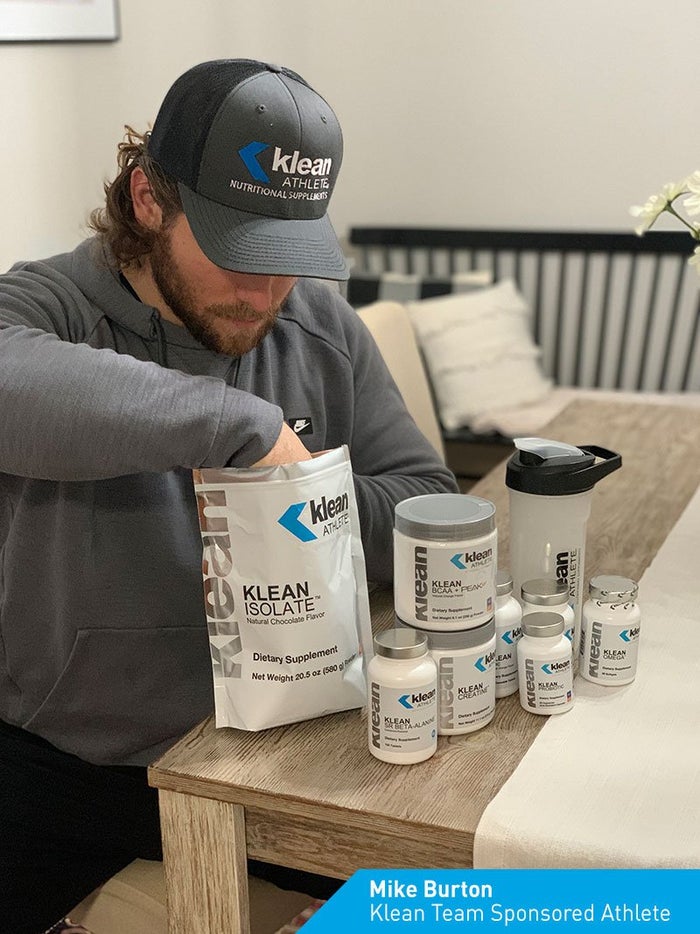
The Brilliant Extras
Regardless of the sport or how hard athletes train, proper energy levels and muscle integrity are possibly two of the most important factors when it comes to living an active lifestyle and reaching peak performance. Research has demonstrated that magnesium intake in athletes is suboptimal which can lead to compromised performance. Consuming one capsule of Klean Magnesium Supplement, one to four times per day, will support the body’s ability to produce and utilize energy (ATP) for muscle function, protein synthesis and optimal recovery between workouts.4‡
Research is mounting in support for Vitamin D as a multitasking superstar that provides not just support for the bones, but also supports the muscular, and immune systems. Klean Vitamin D Tablets can fill nutritional gaps by providing vitamin D in the form of: D3 (cholecalciferol).
Now let’s talk probiotics which inhabit our gut 24/7 with benefits to keep an athlete’s engines fit and primed for daily activity. Our so-called gut microbiome helps us produce essential vitamins, absorb minerals more efficiently, synthesize more lactase enzymes so we can break down milk sugar, support our immune system, 70% of which resides in our gut, and provide numerous other benefits that researchers are learning about every day.3 Athletes can support their microbiome by consuming one NSF Certified for Sport® Klean Probiotic capsule a day to provide 15 billion CFU (colony-forming units) of live, healthy bacteria from a variety of bacterial strains that synergistically support human health.‡
On a final note, it is a given that adequate rest and training go hand in hand, and sleep is a crucial part of an athlete’s daily regimen. To ensure proper sleep, research indicates that supplemental melatonin can decrease the time needed to fall asleep and support overall sleep quality. Athletes can promote their body’s natural melatonin production by taking two sprays of Klean Melatonin raspberry lemonade-flavored liquid spray before bed to support the body’s sleep-wake cycle.‡
The Bottom Line on Nutrient Timing and Performance
Exercise adaption and recovery have no beginning or end. Therefore, it is essential for athletes to learn how to use nutrient timing to progressively challenge and push their limits while minimizing negative ramifications. It is clear that research supports the consumption of performance-supporting nutrients at specific peri-exercise times, but overall, athletes that commit to fuelling properly 24/7 will recover, adapt and ultimately reap the most sizable physiological benefits which translate to remarkable performance progression.‡
References
Arciero, P.J., Ives, S.J., Norton, C., Escudero, D.; Minicucci, O., O’Brien, G., Paul, M., Ormsbee, M.J., Miller, V., Sheridan, C., et al. (2016). Protein-pacing and multi-component exercise training improves physical performance outcomes in exercise-trained women: The PRISE 3 study. Nutrients, 8(6), 332.
Arent, S.M., Cintineo, H.P., McFadden, B.A., Chandler, A.J., & Arent, M.A. (2020). Nutrient Timing: A Garage Door of Opportunity? Nutrients, 12(1948), 1948.
Jäger, R., Mohr, A.E., Carpenter, K.C., Kerksick, C.M., Purpura, M., Moussa, A., et al. (2019). International Society of Sports Nutrition Position Stand: Probiotics. Journal of the International Society of Sports Nutrition, 16(1), 62.
Laires, M.J., Monteiro, C.P., Matias, C.N., Santos, D.A., Silva, A.M., & Bicho, M. (2014) Magnesium status and exercise performance in athletes. Trace Elements and Electrolytes, 31(1), 13-20.
Thoman, D.T., Erdman, K.A., & Burke, L.M. (2016). Position of the Academy of Nutrition and Dietetics, Dietitians of Canada, and the American College of Sports Medicine: Nutrition and Athletic Performance. Journal of the Academy of Nutrition and Dietetics, 116(3), 501-528.
Trommelen, J. & van Loon, L.J. (2016). Pre-sleep protein ingestion to improve the skeletal muscle adaptive response to exercise training. Nutrients, 8(12), 763

